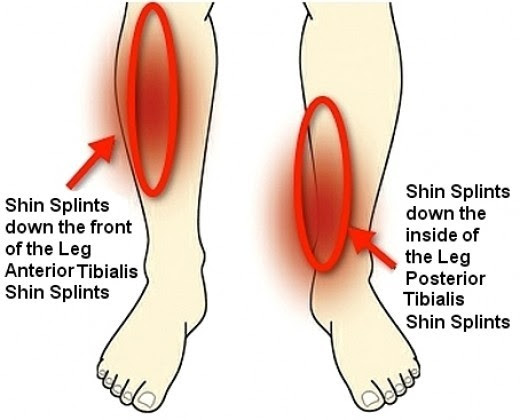 Understanding Shin Splints
Understanding Shin Splints
Shin splints are a common condition affecting runners. While most commonly referring to medial tibial stress syndrome, a painful inflammation of the inner border of the tibia (shin bone) from repetitive calf muscle pull, the condition can also be from tendonitis, or a stress fracture of the tibia. A stress fracture results when repetitive stress or impact causes bone injury which does not have the chance to heal due to continued stresses, and cumulatively results in a break in the bone.
Common Causes of Shin Splints
The most common causes of shin splints include a change in the running surface, muscle imbalance, worn or improper running shoes such as wearing court sport sneakers for running, or increases in workout distance, frequency or intensity. Even small training changes, like switching from a treadmill to pavement, can increase stress on the lower limbs.
-
Sudden increases in running distance, speed, or training frequency
-
Running on hard or uneven surfaces
-
Muscle tightness or imbalance between the calf and shin muscles
-
Wearing improper or worn-out footwear
How to Prevent Shin Splints
Prevention occurs by starting with the appropriate running shoe for your foot type. Evaluation of foot and ankle alignment will assist with finding the proper running shoes for pronators, those with low arches whose feet roll in while running, and supinators, those with high arches whose feet roll out with running. Most running shoe manufacturers have shoes for the different foot types. The knowledgeable staff at the Runner’s High can evaluate your foot and ankle and recommend the appropriate running shoe type.
Slowly increasing the distance, frequency, and velocity of running can allow the body to accommodate to the stresses of running. Running on soft or cushioned surfaces can also reduce stress on the lower limb and prevent shin splints. Maintaining balanced strength between the front (anterior tibialis) and back (calf) muscles helps reduce tension along the shin. Simple exercises—such as calf raises and toe lifts—can support stability and flexibility.
Treatment Options for Shin Splints
The treatment for shin splints includes relative rest with a period of no running. Conditioning can be maintained by non-impact exercises such as cycling or swimming. Stretching and strengthening to balance muscle strength on the front of the leg with the calf muscles is important. If a stress fracture occurs, rest and avoidance of impact and repetitive stresses is necessary to allow healing. AOSMI’s board-certified physicians use diagnostic imaging and personalized treatment plans to help patients return safely to activity.
Care Across New Jersey
Advanced Orthopedics and Sports Medicine Institute (AOSMI) provides comprehensive care for runners and athletes dealing with shin splints, overuse injuries, and leg pain. We offer injury care locations across multiple convenient locations in New Jersey, including:
Request an Appointment
AOSMI’s integrated approach combines orthopedic care, physical therapy, and sports performance programs to help patients on their care journey. Schedule a consultation with a physician near you.







